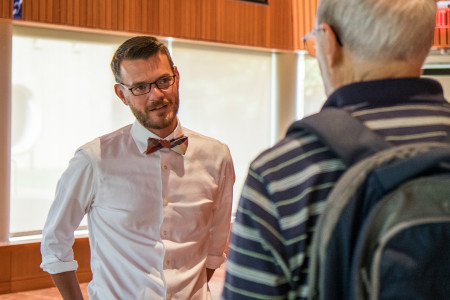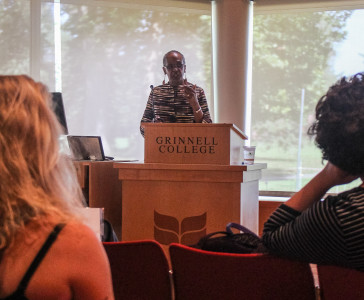
Samantha Maly-schmidt
malyschm@grinnell.edu
Over the course of the week, Grinnell has welcomed several distinguished guests to give talks as part of the Global Public Health Symposium. JRC 101 housed presentations by alumnus Jeremy Youde ’99, the United Nations Children’s Fun (UNICEF) Deputy Representative Clemencia Aramburu and the leader of the Scholar’s Convocation, Shiriki Kumanyika, as well as four Grinnell alumni currently working in public health. Paul Farmer, the Chair of the Department of Global Health and Social Medicine at Harvard Medical School, will conclude the symposium next Friday, Sept. 18, at 7 p.m.
The speeches were spread out over the course of the week and featured a wide variety of topics, starting with the World Health Organization’s (WHO) reaction to Ebola, followed by a discussion of how communities in Peru dealt with cholera and natural disasters, concluding with a talk about how the international epidemic of obesity is being confronted by WHO.
Youde’s main criticisms concerning the shortcomings of WHO in responding to the global health emergency of Ebola were mainly directed at the weak bureaucratic structure of the organization and internal reluctance over the political outcomes of declaring Ebola a crisis situation.
“The way that the organization is structured itself, it is just not really structured to be a rapid response sort of organization,” Youde said. “They don’t have much money, they don’t have their own personnel… [so] there is this lag time that’s built into the organization.”
Youde believes that many of the issues that plagued WHO during the Ebola crisis could be solved by stronger and more politically savvy leadership. As an international organization, its ability to negotiate amongst government actors and effectively garner support for a cause is a key component to any successful campaign. The current Director-General of WHO is Margaret Chan, who has an extensive public health background but little experience in politics.
“The folks who come up through the public health system entirely are awesome at the public health side of things, but they don’t have that political savvy,” Youde said. “When we’re talking about competition for resources and attention, you need to have some sort of hook to be able to get into those meetings … so that you have even a shot at being taken more seriously.”
These factors resulted in a delay of eight months until WHO seriously addressed the disease. If the reaction had been faster, it is almost certain that the epidemic would have been stopped much sooner. The overall behavior and management of WHO in this situation has resulted in the emergence of some questions concerning how to improve the system in order to ensure that the organization will be better prepared for the next crisis.

In contrast to the international blunders of WHO, the speech that Aramburu gave outlined how a small community in Peru bonded together in order to overcome a cholera outbreak. Her presentation focused on the concept that organizations trying to help a struggling country should listen first to the communities who often know things public health officials do not. Aramburu strongly believes that the epidemic was contained within two to three years due to the fact that the community was informed, involved and not disturbed in their management of the situation. As she ended her speech, she urged the international health community to realize that empowering locals to help fight their own diseases often is the best strategy in health emergencies.
“Community-based action is the frontline of prevention, response and recovery in the case of emergencies,” Aramburu said.
Last in the speaker lineup was Shiriki Kumanyika, an emeritus professor of epidemiology in the Department of Biostatistics and Epidemiology at the University of Pennsylvania, as well as the President of the American Public Health Association. Her talk addressed the epidemic of obesity, an issue that is of particular importance in the United States.
For years, America has been one of the countries with the worst rates of obesity. However, even the current data that gives us this distinction may be an underestimate as all of the numbers were voluntarily contributed. Kumanyika described how the upcoming United Nations Global Plan of Action can only attempt to avoid an increase the prevalence of obesity, as any goals to reduce the numbers would be unrealistic. In concluding her speech, she expressed a cautious optimism about the future of global obesity, believing that it is possible for cultural shifts to occur that support a healthy diet and active lifestyle.
The symposium will end next week with a presentation by Paul Farmer, who is an author of several influential books on the topic of global health. Farmer has worked mostly in Haiti and Rwanda. His work focuses on the challenges of delivering healthcare in the developing world.

































































